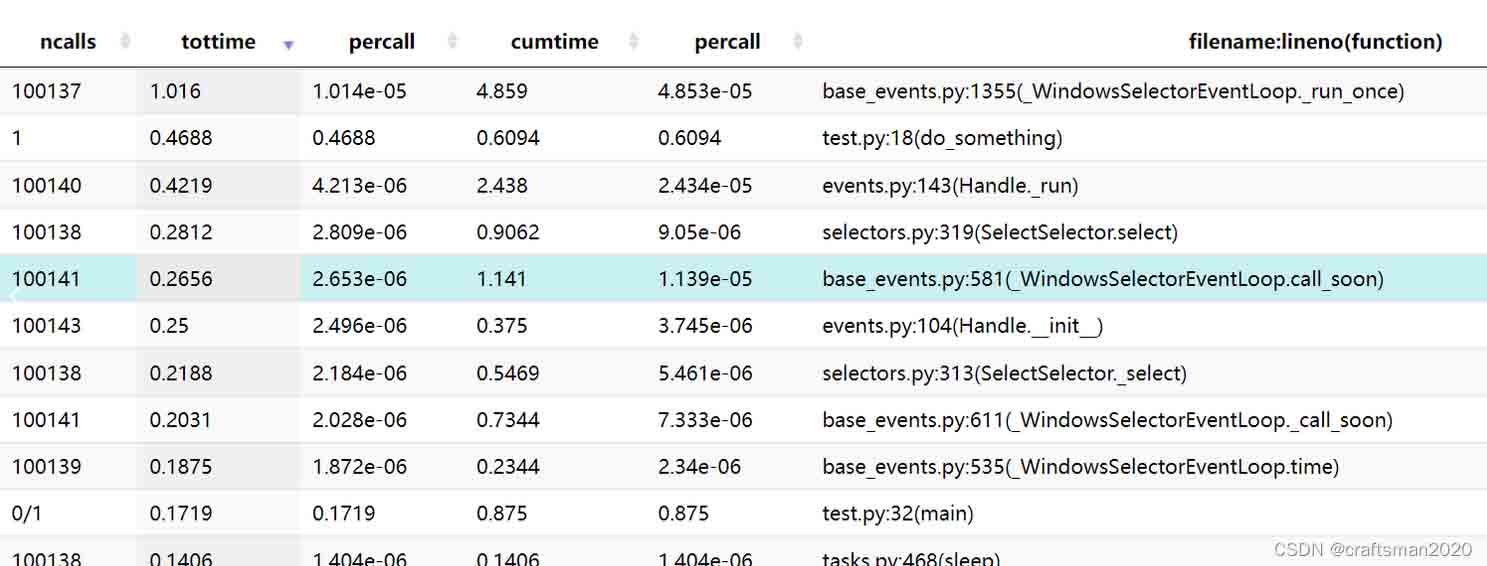Python中的asyncio性能分析
作者:craftsman2020
1. 工具
1.1 cProfile
一般对分析python性能的工具都会用cprofile。
但是这玩意对多线程和asyncio的支持并不友好,如果用它对asyncio分析,会发现CPU都耗费在了poll上面,无法确定到底耗费在哪些协程上。
例如:
会出现python - What is correct way to use cProfile with asyncio code? - Stack Overflow这样的问题。
用法:
python3 -m cProfile -o test.prof test2.py
运行完会生成一个test.prof文件,本文第2节介绍如何通过可视化工具查看这个文件。
也可以通过cprofilev来查看。
pip install cprofilev

cprofilev -f ./test.prof
浏览器中打开运行上方代码后生成的ip和端口号,如下:

2.1 yappi
这个工具可以测多线程、asycio等多种场景。
其实,CPython本身就自带三个调优工具,它们分别是cProfile,Profile和hotshot。
这三个工具对多线程的Python程序的性能剖析支持得都不好,开发者必须想办法分别对线程进行profile,然后再把结果合并。
而yappi的出现就是为了解决Python多线程程序的profile问题。
安装:
pip install yappi
下面先通过一个简单案例介绍使用yappi库,这是对多线程程序进行profile的代码例子。
需要注意的是,yappi.set_clock_type函数的参数,如果是cpu,代表统计的是在CPU上执行的时间,如果是wall,代表统计的是持续的时间。
import yappi
if __name__ == "__main__":
# yappi.set_clock_type("wall")
yappi.set_clock_type("cpu")
yappi.start()
for i in range(10):
t = threading.Thread(target=sum, args=(100, i,), name="hello"+str(i))
t.start()
main_thread = threading.currentThread()
for t in threading.enumerate():
if t is not main_thread:
t.join()
yappi.get_func_stats().print_all()
yappi.get_thread_stats().print_all()
你可以按上面这个例子改造你自己多线程程序,然后运行,就会得到如下的分析结果。
Clock type: CPU Ordered by: totaltime, desc name ncall tsub ttot tavg ..ns/2.7/lib/python2.7/threading.py:752 Thread.run 10 0.000137 2.428557 0.242856 ..thub/Asgard/samples/yappi/yappi_sample.py:16 sum 10 0.000089 2.428420 0.242842 ..ub/Asgard/samples/yappi/funcs.py:5 consumer_time 10 0.414581 2.428331 0.242833 ..s/2.7/lib/python2.7/random.py:238 Random.randint 109362 0.729320 1.926393 0.000018 ..2.7/lib/python2.7/random.py:175 Random.randrange 109362 0.860899 1.197073 0.000011 ../2.7/lib/python2.7/threading.py:726 Thread.start 10 0.000224 0.001801 0.000180 ..7/lib/python2.7/threading.py:656 Thread.__init__ 10 0.000283 0.001404 0.000140 ..s/2.7/lib/python2.7/threading.py:603 _Event.wait 10 0.000152 0.001217 0.000122 ..7/lib/python2.7/threading.py:309 _Condition.wait 12 0.000423 0.001210 0.000101 ..2.7/lib/python2.7/threading.py:866 Thread.__stop 10 0.000255 0.000956 0.000096 ..s/2.7/lib/python2.7/threading.py:911 Thread.join 10 0.000257 0.000761 0.000076 ..ersions/2.7/lib/python2.7/threading.py:542 Event 10 0.000068 0.000587 0.000059 ../python2.7/threading.py:400 _Condition.notifyAll 10 0.000143 0.000580 0.000058 ..ons/2.7/lib/python2.7/threading.py:242 Condition 20 0.000169 0.000523 0.000026 ..7/lib/python2.7/threading.py:561 _Event.__init__ 10 0.000153 0.000519 0.000052 ..lib/python2.7/threading.py:373 _Condition.notify 10 0.000191 0.000403 0.000040 ..b/python2.7/threading.py:260 _Condition.__init__ 20 0.000286 0.000354 0.000018 ../python2.7/threading.py:300 _Condition._is_owned 22 0.000156 0.000292 0.000013 ..ib/python2.7/threading.py:709 Thread._set_daemon 10 0.000111 0.000242 0.000024 ...7/lib/python2.7/threading.py:1152 currentThread 21 0.000137 0.000205 0.000010 ..s/2.7/lib/python2.7/threading.py:64 Thread._note 54 0.000201 0.000201 0.000004 ...7/lib/python2.7/threading.py:59 Thread.__init__ 40 0.000135 0.000135 0.000003 ..2.7/threading.py:297 _Condition._acquire_restore 12 0.000087 0.000130 0.000011 ..hon2.7/threading.py:294 _Condition._release_save 12 0.000071 0.000108 0.000009 ../2.7/lib/python2.7/threading.py:570 _Event.isSet 20 0.000061 0.000061 0.000003 ..b/python2.7/threading.py:1008 _MainThread.daemon 10 0.000037 0.000037 0.000004 ..ns/2.7/lib/python2.7/threading.py:1183 enumerate 1 0.000016 0.000021 0.000021 name id tid ttot scnt Thread 3 123145399676928 0.087168 37 Thread 1 123145391263744 0.087128 138 Thread 8 123145420709888 0.087124 140 Thread 9 123145424916480 0.087121 40 Thread 2 123145395470336 0.087109 27 Thread 6 123145412296704 0.087088 92 Thread 5 123145408090112 0.087084 125 Thread 7 123145416503296 0.087072 51 Thread 4 123145403883520 0.087069 139 Thread 10 123145429123072 0.087030 132 _MainThread 0 140735541031744 0.023092 13
上半部分是函数调用统计。
- ncall: 调用次数
- tsub: 不包含子函数所占用的CPU时间
- ttot: 包含子函数所占用的CPU时间
- tavg: 包含子函数时平均占用CPU时间
下半部分是所有线程的统计结果。
- tid 线程
- idttot 线程总的CPU占用时间
- scnt 线程被调度到CPU上的次数
再看一个例子:
通过运行下方例子就会输出每个函数/协程所占用的时间,并生成一个test.prof文件:
import asyncio
import sys
import yappi
test_time = 5 # 测试时间
async def exit():
await asyncio.sleep(5)
yappi.get_func_stats().print_all()
yappi.stop()
stats = yappi.convert2pstats(yappi.get_func_stats())
stats.dump_stats("test.prof")
asyncio.get_event_loop().stop()
sys.exit(0)
async def do_something(num):
for i in range(num):
i = i+1
await asyncio.sleep(0)
async def test1():
await do_something(10000)
async def test2():
await do_something(100000)
async def main():
asyncio.get_event_loop().create_task(exit())
while True:
await test1()
await test2()
yappi.set_clock_type("cpu")
yappi.start()
loop = asyncio.get_event_loop()
with yappi.run():
loop.run_until_complete(main())
输出如下图:

2. 可视化
2.1 SnakeViz
可以针对上面工具生成的prof文件进行分析,然后生成分析结果可以直观地看到cpu时间都耗费在哪里了。
使用方法:
pip install snakeviz snakeviz test.prof
就会自动打开一个网页来展示分析的情况。


2.2 gprof2dot
gprof2dot可以将prof文件生成一个图片。
安装:
apt-get install graphviz pip install gprof2dot
运行:
gprof2dot -f pstats test.prof | dot -Tpng -o output.png
生成的图片如下图所示

总结
以上为个人经验,希望能给大家一个参考,也希望大家多多支持脚本之家。
